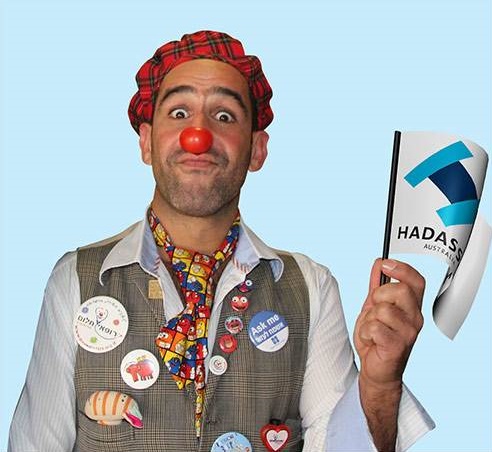
Like many countries, Israel sent a crack team of emergency medical experts to help the Nepalese after the devastating earthquake killed close to 10,000 people.
Unlike anyone else, they also sent in the clowns.
It’s not unusual for psychologists and trauma counselors to accompany emergency teams when they’re dispatched to find victims of large-scale disasters. Dealing with death and horrific injuries can impact significantly on the emotional and psychological well-being of these teams, so having access to support personnel in the field is very important.
The emotional and psychological needs of the victims, while important, is often considered as secondary to finding and extracting them from harm.
Not so for Israel. The country understands very well that dealing with victim issues at the outset can make a real difference to how they rehabilitate in the future. It was quite a sight, therefore, when a small group of medically-trained clowns arrived in Nepal with the Israeli search-and-rescue contingent.
You couldn’t help but laugh.
Dealing with children in distress is particularly important because of the long-term impact on the children and their families and, ultimately, on how that plays out on society. These are lessons learned by the Jerusalem Crisis Intervention Center, a unique service connected to Hadassah’s Unit of Child and Adolescent Psychiatry.
Among the clowns to arrive in Nepal was David ‘Dush’ Barashi, the head medical clown at Hadassah, the first hospital in Israel to introduce clowns as part of the therapeutic response to young patient care.
“The fact that the Israel Defense Force sees the value in sending medical clowns to a disaster situation like we saw in Nepal, speaks volumes about their role in dealing with trauma,” says Ron Finkel, President of Hadassah Australia*.
“The clown can communicate with a child far more effectively than an adult, no matter how caring he or she may be. Communication is key to the efficacy of the medical intervention, especially in time-critical situations.
“Easing the suffering is a mantra of Hadassah and indeed of all hospitals in Israel that follow the model established by the founder of Hadassah, Henrietta Szold, more than a century ago.”
In Israel, medical clowns are regarded as a critical part of the medical team. Studies have shown that one of the best ways to ease children’s trauma is to heal psychological scars with laughter. While Nepal was an extreme case in a less than ideal medical setting, the fundamental need for clowns remains the same. It does not matter whether the patient has been extracted from a collapsed building or is in a secure hospital environment dealing with the prospect of an injection, the reassurance that the clown brings is vital.
None of the clowns that arrived with Dush following the April 25 quake were picked at random or chosen solely for their ability to make people laugh. In fact, every clown working at Hadassah has trained at university level in a skill set that is now becoming de rigueur in an increasing number of major hospitals worldwide.
When Dush was interviewed at the IDF’s field hospital, he said that twisting balloons into animals, surprising patients with flowers, handing out toys and playing games with the children was all part of an agreed strategy to break the atmosphere of fear and stress.
There are many photographs that have travelled the world’s media that play testament to the effectiveness of the clowns’ intervention. It may seem surreal to see children with broken legs and bandaged heads laugh, but the adage that laughter is the best medicine shines through every image with a power that defies language, religion, gender, geography or politics.
A fascinating aside to the Israeli medical clowns in Nepal is their relevance to the three key pillars that underpin Hadassah’s standing as a medical center of excellence. In every case, the clowns HEAL the patients through humor, TEACH their families and communities that life will go on as long as patient care is central to the medical intervention, and that the more we know about the power of laughter and the more RESEARCH we commit to this little understood aspect of the medical model, the better the outcomes will be.
*Hadassah Australia is committed to raising funds to support the Medical Clown Project at Hadassah.
Learn more about the Hadassah Medical Clown project.
